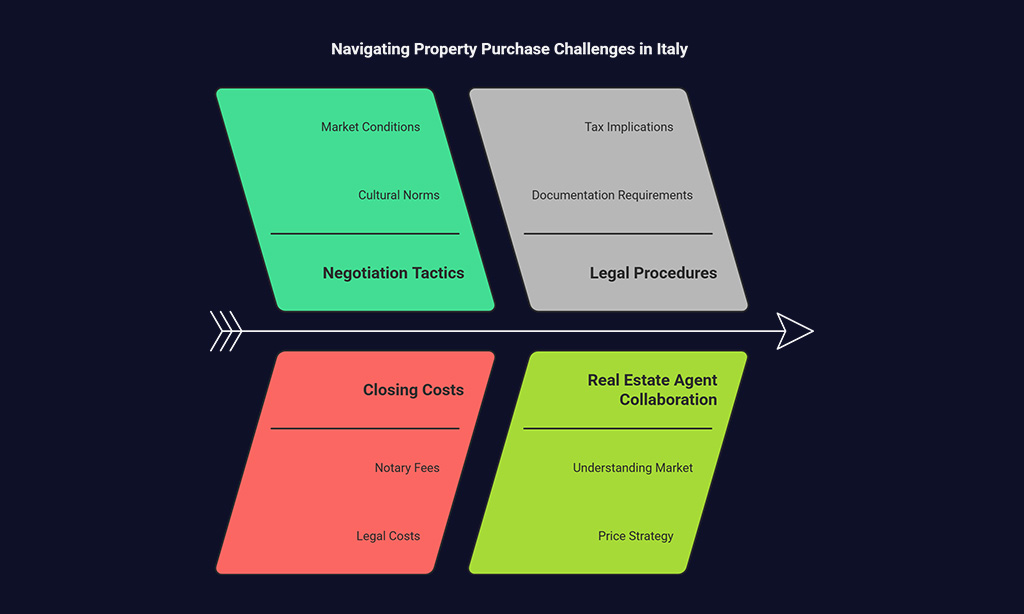Italy’s unique charm, rich culture, and scenic beauty make it one of the world’s top destinations for travelers. Agritourism, which combines agriculture and tourism, has gained popularity as more people seek authentic, rural experiences.
With the right investment, buying a property in Italy for agritourism can be a dream come true for those wanting to offer guests the opportunity to experience the Italian countryside firsthand.
However, buying a property and launching an agritourism business in Italy requires careful planning, financial foresight, and an understanding of local laws and customs.
This comprehensive guide provides a clear, detailed, and practical roadmap of the 10 steps to buying a property in Italy for agritourism, ensuring you’re well-prepared to start your new venture.
10 Steps to Buying a Property in Italy for Agritourism
Let’s take a look.
Step 1: Research and Understand Agritourism Laws in Italy
Before making any decisions, it’s essential to familiarize yourself with agritourism laws and regulations in Italy. Agritourism in Italy is regulated at both the national and regional levels, and compliance with these laws is vital for ensuring your business runs smoothly.
Agritourism Regulations and Permits
Agritourism in Italy is defined as the offering of accommodation and meals to guests on a working farm. In order to legally operate, you must obtain various permits, including:
- A hospitality permit (licenza agrituristica) to accommodate guests.
- A food and beverage permit for preparing and serving meals, which is subject to health regulations.
- An agricultural certification if you plan to offer agricultural activities as part of your business, such as wine-making, olive picking, or farm tours.
These regulations vary depending on the region, so it’s important to consult local authorities for detailed requirements specific to your location.
Legal Requirements for Operating an Agritourism Business
Each region in Italy has its own set of rules for agritourism businesses. For example, Tuscany has strict regulations governing the number of guests allowed on a farm, while Sicily may offer more flexibility in terms of the types of services you can provide. Familiarizing yourself with these rules early on can save you time and ensure compliance.
Important Local and Regional Laws to Consider
Some regions have stricter zoning laws than others, particularly regarding the use of agricultural land for non-farming purposes. Understanding whether the property you’re interested in is zoned for agritourism is essential before making a purchase.
Key Points to Consider
- Regulations: Understand both national and regional agritourism regulations.
- Permits: Research and apply for all necessary permits.
- Zoning Laws: Ensure the property is suitable for agritourism under local zoning laws.
Step 2: Determine Your Ideal Location for Agritourism
Choosing the right location is one of the most critical decisions you’ll make when buying a property in Italy for agritourism. The location will not only impact your business’s success but also define the kind of experience you provide to your guests.
Popular Agritourism Regions in Italy
Some of the most sought-after regions for agritourism include:
- Tuscany: Known for its iconic rolling hills, vineyards, and olive groves, Tuscany is one of the most popular agritourism regions. It offers easy access to cultural cities like Florence and Siena, making it ideal for attracting international tourists.
- Umbria: Often called “the green heart of Italy,” Umbria is renowned for its lush landscapes, charming medieval towns, and authentic rural atmosphere. It’s an excellent choice for those seeking a quieter, more off-the-beaten-path experience.
- Sicily: Sicily’s diverse landscapes, rich history, and Mediterranean climate make it an attractive choice for agritourism. The island offers a mix of coastal, mountainous, and agricultural areas, making it suitable for a wide variety of farm activities.
How to Choose the Best Location for Your Property
When selecting your location, consider the following factors:
- Tourism Demand: Popular tourist destinations like Tuscany will offer higher demand, but they will also come with higher property prices. On the other hand, regions like Umbria and Abruzzo may offer more affordable properties with a growing agritourism market.
- Climate: Italy’s climate can vary significantly from north to south. Regions like Tuscany and Umbria are ideal for producing wine and olive oil, while southern regions like Sicily are perfect for citrus farming and Mediterranean crops.
Factors to Consider in Location Selection:
| Factor | Tuscany | Umbria | Sicily |
| Climate | Temperate, ideal for vineyards | Mild, good for olive trees | Mediterranean, good for citrus |
| Tourism Demand | High demand, popular for wine tours | Quiet, off-the-beaten-path appeal | High demand for beach and historical tours |
| Land Cost | Expensive | More affordable | Moderate pricing |
| Proximity to Major Cities | Close to Florence, Pisa | Near Perugia, Assisi | Accessible from Palermo, Catania |
Step 3: Establish Your Budget and Financial Plan
The cost of buying a property for agritourism in Italy can vary widely, depending on the region and the type of property. It’s crucial to have a clear financial plan to understand all the expenses involved in the purchase and the ongoing operation of your agritourism business.
Estimating Costs for Property Purchase and Renovations
The cost of properties in Italy can differ dramatically between regions. For example, a vineyard estate in Tuscany can cost upwards of €1 million, while a farmhouse in less touristy areas like Abruzzo may be much more affordable.
Renovations can also add substantial costs. If you’re buying an older property, be prepared for renovation costs, which can range from €50,000 to €200,000, depending on the size and condition of the property.
Financial Assistance for Agritourism Projects in Italy
The Italian government offers various grants and subsidies for agritourism businesses, especially if you focus on sustainable or organic farming. Check with local chambers of commerce or agricultural agencies to find out what financial assistance is available in your region.
Securing Financing and Loans
Most banks in Italy offer loans to both Italian and foreign buyers, although you will need to provide proof of income and a stable financial background. The interest rates for foreign buyers may be higher than for Italian residents, so it’s essential to shop around for the best deal.
Financial Planning Tips
| Expense Category | Estimated Cost | Notes |
| Property Purchase | €150,000 – €1,500,000 | Based on location, size |
| Renovation Costs | €50,000 – €300,000 | Depends on the property’s condition |
| Annual Operating Costs | €30,000 – €100,000 | Staff salaries, utilities, marketing |
| Government Grants/Loans | €10,000 – €100,000 | Regional support for agritourism |
Step 4: Find the Right Property for Your Agritourism Business
When searching for the perfect property for agritourism, you need to consider the type of farm you want to run, as well as the potential for guest accommodations.
Types of Properties Ideal for Agritourism
There are several types of properties suitable for agritourism, including:
- Farmhouses: Classic Italian farmhouses can be renovated into charming guest accommodations. They often come with land that can be used for farming activities such as wine or olive oil production.
- Vineyards and Olive Groves: These properties not only provide a farming experience but can also be used to produce wine, olive oil, and other products for sale.
- Agricultural Land: If you have a vision for starting from scratch, agricultural land with fertile soil can be transformed into a working farm.
Working with Real Estate Agents in Italy
It’s highly recommended to work with a local real estate agent who specializes in agritourism properties. These agents can help you navigate the complexities of buying a property in Italy, including legal paperwork, property inspections, and negotiations.
Evaluating Properties for Agritourism Potential
Not all properties are suitable for agritourism, so you need to assess each property’s potential. Consider the size of the land, the condition of the buildings, and whether the property has the infrastructure to support farming and tourism.
Property Evaluation Checklist
| Feature | Ideal Property | Notes |
| Size of Land | 5-10 hectares | Enough for farming and guests |
| Condition of Buildings | Requires minimal renovations | Can be renovated within budget |
| Proximity to Attractions | Close to historical landmarks | Attracts more tourists |
| Access to Water and Utilities | Functional infrastructure | Essential for farming |
Step 5: Conduct Property Inspections
Property inspections are critical to understanding the true condition of the property you intend to purchase.
Key Aspects to Inspect in Agritourism Properties
When inspecting the property, ensure that the land is suitable for agricultural purposes and that the buildings can be converted into comfortable accommodations. Pay attention to:
- Structural Integrity: Check the foundations, roof, and walls.
- Utilities: Ensure that electricity, water, and sewage systems are functional.
- Land Quality: Verify the quality of soil for farming activities.
Hiring Experts for Property Inspections
Engage local professionals, such as architects, engineers, and agronomists, to conduct thorough inspections. They can identify any underlying issues that might not be immediately visible.
Inspection Checklist
| Area to Inspect | Key Questions to Ask |
| Structural Integrity | Are there cracks in the foundation or walls? |
| Utilities and Water Supply | Is there a reliable water supply and sewage system? |
| Land Quality | Is the soil fertile and suitable for crops? |
Step 6: Understand the Cost of Renovation and Conversion
Renovating a property into a functional agritourism destination can be costly, but it’s also a critical step in turning a farmhouse into a lucrative business.
Renovation Costs for Agritourism Properties
Renovations can include converting barns into guest rooms, updating kitchens, and creating common spaces for guests. Depending on the scope, renovations can cost between €50,000 to €300,000 or more.
Local Building Codes and Permits for Renovations
Italy has strict regulations when it comes to renovations, especially in protected areas or historical buildings. Always check with local authorities to obtain the necessary permits before starting construction.
Estimated Renovation Budget
| Renovation Type | Estimated Cost | Notes |
| Guest Accommodation | €50,000 – €150,000 | Depends on the size and condition |
| Agricultural Facilities | €20,000 – €50,000 | Farm equipment, irrigation systems |
| Common Areas | €10,000 – €100,000 | Dining rooms, outdoor spaces |
Step 7: Negotiate the Purchase and Close the Deal
Negotiating the purchase of property in Italy can be tricky, especially if you’re a foreigner.
How to Negotiate Property Prices in Italy
Negotiating in Italy is often done with respect and patience. Sellers typically expect negotiations, so don’t be afraid to make a reasonable offer. Work with your real estate agent to understand market conditions and pricing.
Closing Costs and Procedures for Foreign Buyers
Foreign buyers need to account for closing costs, which typically range from 10% to 15% of the property’s purchase price. These costs cover notary fees, legal costs, and taxes. It’s important to factor this into your financial planning.
Step-by-Step Guide to Closing a Property Deal in Italy
- Agree on a price: Reach an agreement with the seller on the final purchase price.
- Preliminary Contract (Compromesso): Sign a preliminary contract and pay a deposit (usually 10%).
- Notary Appointment: Finalize the deal with a public notary, who will ensure the legality of the transaction.
- Full Payment and Transfer of Ownership: Pay the remaining balance and officially transfer the property title.
Step 8: Register Your Agritourism Business and Obtain Necessary Licenses
Once you have secured your property and completed the purchase, the next step is to officially register your agritourism business. This step ensures that your operations are legally compliant and recognized by Italian authorities.
Business Registration Process
In Italy, agritourism businesses must be registered with the local Chamber of Commerce (Camera di Commercio). You will need to provide a variety of documents, including proof of property ownership and a business plan that outlines your agritourism concept. Additionally, depending on your region, you may need to register for specific agritourism licenses.
Types of Licenses You Will Need
- Agritourism License: This is a specific license that permits you to run an agritourism operation. You can apply for it through the local Agriculture Office (Ufficio Agricoltura) and must meet certain conditions, such as demonstrating that your business contributes to agricultural activities.
- Food and Beverage License: If you plan to serve meals to guests, you must obtain this license, which will require adherence to health and safety regulations.
- Tax Registration: Ensure your business is properly registered with the Italian tax authorities (Agenzia delle Entrate) and obtain a VAT number if necessary. Agritourism businesses may also be eligible for certain tax breaks, so be sure to consult a tax professional.
Tips for the Registration Process
- Hire Local Experts: Work with local accountants or legal experts who are familiar with Italian bureaucracy to ensure all your documents are in order and the registration process is smooth.
- Plan Ahead: The registration process can take time, so make sure you allocate enough time in your timeline to complete it before starting any operations.
Key Steps for Business Registration
| Step | Description |
| 1. Register with the Chamber of Commerce | Submit required documents and business plan. |
| 2. Obtain Agritourism License | Apply through the Ufficio Agricoltura. |
| 3. Apply for Food and Beverage License | If offering meals, meet hygiene and health standards. |
| 4. Register with Tax Authorities | Obtain VAT number and register your business for taxes. |
Step 9: Market Your Agritourism Business
Marketing is key to the success of your agritourism business. Whether your focus is on food, wine, or agricultural experiences, it’s essential to develop a strong marketing strategy that appeals to both domestic and international tourists.
Building Your Brand
Your brand identity will be the cornerstone of your marketing efforts. To build a memorable brand, consider:
- The Story of Your Farm: Share the history of your farm, the agriculture you produce, and the experience guests can expect.
- Unique Selling Points: What makes your agritourism business stand out? It could be farm-to-table meals, wine tasting, hands-on farming experiences, or eco-friendly practices.
- Authenticity: Focus on providing an authentic experience that showcases the charm of Italy’s countryside. Modern travelers seek genuine experiences, so staying true to Italian agricultural traditions is a significant advantage.
Digital Marketing Strategies
In today’s digital age, online visibility is critical. Some effective digital marketing strategies for agritourism include:
- Website Development: Build a visually appealing, user-friendly website that offers essential information about your agritourism business, such as services, pricing, booking options, and your farm’s story.
- Social Media: Utilize platforms like Instagram, Facebook, and Pinterest to showcase the beauty of your farm, the activities you offer, and the experience of staying at your property. Stunning images and videos can attract potential guests.
- SEO: Optimize your website for search engines using keywords like “agrictourism in Tuscany,” “farm stays in Italy,” or “wine and food tours in Italy.” This helps you rank higher on search engines, making it easier for guests to find you.
Working with Travel Agencies and Tour Operators
Partner with travel agencies that specialize in agritourism or rural experiences. You can also join networks like the Agritourism Associations in Italy to increase your visibility within the agritourism community.
Incorporating Online Booking Platforms
Platforms like Airbnb, Booking.com, and Agriturismo.it allow agritourism properties to list their services for a wider reach. These platforms also make it easier for guests to book directly, giving your property access to global travelers.
Marketing Action Plan
| Marketing Channel | Action Plan |
| Website | Create a user-friendly, visually appealing website. |
| Social Media | Share stunning photos, guest reviews, and promotions. |
| SEO | Optimize for agritourism-related keywords. |
| Partnerships | Collaborate with travel agencies and agritourism networks. |
Step 10: Offer Exceptional Customer Experiences
The success of your agritourism business hinges on the quality of the experiences you offer. To attract repeat guests and positive reviews, make sure you provide exceptional service and memorable experiences.
Creating Unique Guest Experiences
Think about what kind of experiences your guests will cherish. Options include:
- Farm Tours: Show guests how you grow and harvest crops, raise animals, or make artisanal products like cheese or olive oil.
- Cooking Classes: Teach guests how to prepare traditional Italian dishes using ingredients from your farm.
- Wine and Olive Oil Tastings: If your farm produces wine or olive oil, consider offering tastings paired with local food.
- Eco-friendly Experiences: Appeal to sustainability-conscious travelers by offering eco-friendly accommodations or farm tours that emphasize sustainable practices.
Going Above and Beyond
Personalized service is key to creating loyal customers. From the moment guests arrive, ensure they feel welcomed. Offer custom touches like a welcome basket of local products or personalized itineraries for exploring the region.
Collecting Feedback and Continuous Improvement
Customer feedback is invaluable for improving your agritourism business. After each stay, encourage guests to leave reviews and ask for suggestions on how you can improve. Use this feedback to make improvements and ensure your guests have an even better experience on their next visit.
Creating Memorable Guest Experiences Checklist
| Experience Type | Ideas to Enhance Guest Experience |
| Farm Tours | Offer guided tours explaining farming techniques. |
| Cooking Classes | Teach traditional recipes using farm-fresh ingredients. |
| Wine Tasting | Pair wines with regional dishes for an authentic experience. |
| Eco-friendly Practices | Promote sustainable farming and offer green accommodations. |
Final Thoughts on Buying a Property in Italy for Agritourism
Investing in agritourism in Italy is a significant and rewarding undertaking. Whether you’re drawn to the vineyards of Tuscany, the rolling hills of Umbria, or the sunny shores of Sicily, Italy’s countryside offers a wealth of opportunities for those passionate about agriculture, tourism, and authentic experiences.
By following the 10 steps to buying a property in Italy for agritourism, you will be well-equipped to navigate the complexities of the Italian real estate market and create a successful agritourism venture.
From legal regulations and financing to property selection and marketing strategies, each step is crucial to setting up a sustainable and profitable business.
With attention to detail, a clear business plan, and a dedication to offering exceptional guest experiences, your agritourism property can become a haven for travelers seeking to immerse themselves in the beauty and tradition of rural Italy.






































